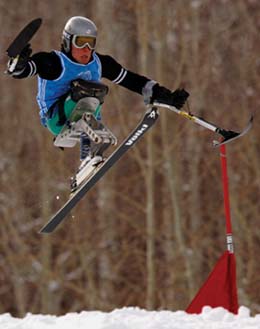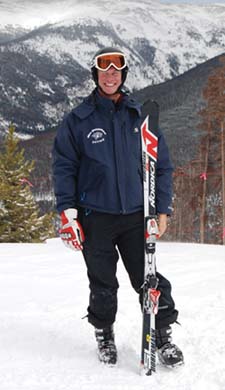 |
 |
| current issue |  | past issues |  | send a letter/news |  | address update |  | advertise |  | about us |  | alumni home |
Features
High HopesPage: < Prev 1 2 3
As word of the program has spread in the past couple of years, Northeast Passage has recruited nearly a dozen new athletes. Like Broderick, many of them have their eye on the 2014 Paralympics, including alpine skier Jon Parker '12 from New Hampshire and Nordic skiier Marlon Shepard '12 from Maine. Josh Moran '11 and Bryan Genovese '11, both from New York, hope to try out for the national sled hockey team. With all his athletes, Carr is just as insistent on the academics as he is on the training. "These athletes need a plan, and education is a huge part of it," he says. "In our world, you can't make a career out of sled hockey or skiing."

|
Along with the guidance and advice they receive, athletes with disabilities at UNH thrive on the camaraderie they find in the Northeast Passage community. They've all had to navigate the rugged mental and physical terrain of life with a disability. They know humor is a key survival strategy—and it's something they love to capitalize on whenever they get a chance. Broderick tells stories about coming home from grade school with an arm sticking out of his backpack. "It was always such a pain," he says of his prosthetic, which he finally quit using. And he caused a stir last year when at Halloween he was (a very realistic) Captain Hook.
And then there's the time the guys were traveling together. A bunch of them loaded their ski champion buddy Tyler Walker '08 into an overhead airplane compartment during early boarding. Walker was born without a complete spine and both legs were amputated when he was 4. "He's pretty compact," says Chace, chuckling as he recalls the prank. "He gave the flight attendant quite a shock when she walked down the aisle doing a final check of the overhead compartments!" (For more about Walker, read "No Mountain Too High")
The road back to competitive hockey was a rough one for Chace, but it was what he wanted to do. He knew the game, so he had a head start. But he had to learn to play all over again. "Sled hockey is so much harder than stand-up hockey," Chace says. "You have to pull your whole body with your arms—and your upper body isn't made to exert that kind of force. I had to really train my upper body. I had to learn to use two sticks instead of one, how to shoot left-handed as well as right-handed. You can't skate backwards, either, which is really tough." Chace had to work especially hard on turning, since one of his ribs on the left side had been removed to repair his spine, compromising his strength and balance. "Plus, you get knocked over all the time!" he says.
 HIS TURN: Ted Broderick '12 is hoping to compete in the 2014 Paralympic Games in the stand-up division. |
But Carr saw Chace's potential. He encouraged him to think big. About a year into their training together, Carr suggested he try out for the national team. "I was really nervous," says Chace. "I didn't think I was ready." But he went anyway. He competed for one of 20 available slots against more than 60 athletes—and wound up with a place on the team. In 2006, just four years after his accident, Chace was off to the Paralympics in Torino, Italy, with the U.S. Sled Hockey team. And his whole family was there in the stands, cheering like crazy, when he scored the winning goal against Germany in the bronze-medal game.
These days, Chace's disability is nearly invisible when he's off the ice. He walks without assistance for the most part, although he occasionally wears a leg brace. "My balance is terrible," he says. He still has severe numbness in parts of his legs and feet. His hips don't work too well. He gets around slowly and carefully. Put him on the ice, though, and the guy can fly. The exhilaration, the competitive drive, the thrill of success—it's all back. The irony of his experience isn't lost on Chace, who is training hard for the upcoming Paralympic Games in Vancouver and also looking ahead to a career in disabled sports and coaching. The same ice that threatened to steal his future has given him back his focus and sense of purpose.
Northeast Passage made it all possible, Chace says. "I had my eye on other schools, but Northeast Passage is unique in what they do. That was a major attraction, plus the sports studies major, the internship possibilities--UNH has given me a lot of direction and different ideas for how to approach my career." Like Chace, all the Northeast Passage recruits find more than support for their athletic talents and ambitions. As much as they love their sport—the thrill of catching air over a ski jump, the rush of streaking across the ice—these athletes discover something even more important, something that will carry them forward whether or not they bring home a medal. They discover they have a future ahead of them that is full of promise. They're ready for takeoff. They can fly. ~
Vancouver Bound!
UNH will be well-represented at the 2010 Paralympics in Vancouver on March 12-21. Hockey player Taylor Chace '10, along with skiers Laurie Stephens '07 and Tyler Walker '08, will all be competing in this year's games. For more information, visit the Paralympics site: www.usparalympics.org. To see them in action, tune in to Paralympic Sport TV: www.paralympicsport.tv.
Read more about Tyler Walker '08, in "No Mountain Too High".
Also watch a video of Tyler Walker and a video of Taylor Chace.
Page: < Prev 1 2 3
Easy to print version
blog comments powered by Disqus
